15 Signs of Body Dysmorphia Among Men in India

Introduction
I was born skinny. You had skinny kids, and then you had me. Lanky beyond repair, so thin, clothes hung off of me as if they were placed in a hangar. Whether this was a genetic mistake or something else, that was anyone’s guess.
Skinny, with massive glasses and braces - the perfect candidate for bullying. Bullying in my life hasn’t just been a chapter - it’s shaped the way I think and interact with people.
From what I can see, in our culture, the concept of unrealistic body and ideal beauty standards have been quite openly spoken about. Over the recent years, body image issues have become quite prevalent. Blame social media or celebrities; facts are facts.
Remember how women are constantly bombarded with “look this way, or look that way, or look like Marilyn Monroe’s drawing of Britney Spears”? Beauty standards have been subject to public concern for a long time. What has slyly slipped under the radar is the rise of body dysmorphia among men.
Body Dysmorphic Disorder (BDD), or men's body image issues, refers to a mental health condition in which you cannot stop obsessing about one or more perceived flaws in your appearance, even if they happen to be minor or people can’t see them.
People with body dysmorphic disorder stress over their appearance and body image, constantly checking the mirror, grooming and soliciting reassurance repeatedly throughout the day, often for hours on end.
People with this disorder constantly perceive fault in themselves and can’t function regularly in their daily lives.
Earlier, men would obsess over their skin, for instance, whether it was full of acne or scars, their nose and its size and form, and their genitals. Today, it's the muscles and whether their muscles are aesthetic enough. They wonder whether they are working out enough or looking good enough.
Being absorbed in their appearance is tough to resist or manage, and can chew up a significant amount of time daily. According to available data, the prevalence of Body Dysmorphic Disorder (BDD) in India is estimated to be around 1-2%.
Attempting to analyse, cure or camouflage the “defect”, nearly all men suffering from body dysmorphic disorder engage in repeated and time-consuming behaviours.

What Are the Symptoms of Body Dysmorphic Disorder?
If you think you’re obsessed with your gym and how your muscles look, it might not be that you are just a fitness freak. Check with the symptoms below and see if you feel called out!
Compulsively Working Out All Day, Everyday
Men suffering from body dysmorphia often face an overwhelming urge to work out every day, driven by the belief that their body is just not good enough. They might fear losing progress or being unable to reach their fitness goals.
In fact, the urge to work out is so strong it causes anxiety and guilt if they skip a session. It’s all about appearances, and this means business.
Working Out in the Face of Sickness
Anyone with body dysmorphia will tell you that they ignore pain or illness, feeling that their appearance might deteriorate if they don’t constantly exercise. For them, rest is for the weak - this exacerbates their obsession with maintaining the “perfect” body, even if this comes at the cost of their health.
Mirror Mirror, on the Wall
Constant self-scrutiny is an important feature of body dysmorphia. Many men constantly check their physical appearance in mirrors or photos, obsessing over perceived flaws. This constant focus on their appearance results in extreme dissatisfaction and a distorted view of their body, even if their physique is well-developed.
Working Out Constantly
Dissatisfied with their physical appearance, men suffering from body dysmorphic disorder constantly want to change or perfect their appearance. And to do this, they will work out relentlessly, sometimes for hours daily.
This behaviour happens because they’re scared that their body isn’t up to societal standards or personal expectations, which causes them to overtrain regularly.
Shirking Responsibilities to Work Out
Prioritising the gym over other responsibilities, such as work, family or social activities, can happen when body dysmorphia takes over.
This behaviour reflects an unending obsession with appearance and the belief that physical perfection should come before personal or professional obligations. This causes them to shirk responsibilities to work out.
Enter - Steroids
Once you're obsessed with yourself, you’ll do anything to look perfect. Men often fall prey to anabolic steroids or supplements. Such substances can result in dangerous health consequences, as men feel desperate to meet unrealistic standards despite their being sufficient risk.
Grooming Too Much
Individuals suffering from body dysmorphic disorder might take part in repetitive grooming behaviours, like shaving, plucking, or constantly checking their skin. Such rituals are driven by a constant need to “fix” perceived flaws, resulting in a time-consuming cycle of self-correction, which can wreak havoc on daily life.
Avoiding Social Situations
Men suffering from body dysmorphic disorder might steer clear of social events or public spaces because they face shame and anxiety regarding their appearance.
They fear being judged or ridiculed, which results in them isolating themselves, limiting social interactions and worsening feelings of inadequacy or loneliness.
A Nip Here, a Tuck There
Men with body dysmorphic disorder might constantly undergo cosmetic surgeries or treatments to try to fix perceived imperfections. Some procedures might bring relief, but only temporarily, as the person seeks more and more, stemming from the dissatisfaction with their appearance.
Hyper focusing on One Body Part
Men suffering from BDD often get obsessed with one particular body part (biceps, chest, etc). The person might feel that this part is greatly flawed and obsess over it unendingly, even injuring it in the process.
When injured, people suffering from BDD often restart working out full-throttle too soon instead of slowly getting back to fitness.
Comparisons
Men suffering from BDD constantly compare their bodies to others because they’re filled with a sense of inadequacy.
This can result in feelings of unresolved jealousy, self-loathing and a distorted perception of what is expected, as they constantly measure their appearance against the perceived perception of others.
Depression and anxiety
Constantly being dissatisfied with one’s appearance can result in mental health struggles like low self-esteem, anxiety or depression. Being continually worried about how one looks can perpetuate a vicious cycle of negative emotions, resulting in more weird behaviour and isolation.
Snap Snap Snap
It’s not as if they’re worried about their photos - they’re probably concerned about some hidden flaw only they can see, and they’re busy trying to hide it from the rest of the world.
Don’t Complement Me
People with BDD can’t accept compliments about their appearance, dismissing them or denying them thanks to an internalised belief that their body is flawed. They can’t digest other’s positive perceptions about them.
Research, Research, Research
Men with BDD spend hours researching body image issues, fitness routines or cosmetic procedures to try to perfect their appearance. This obsession with information can fuel negative behaviours, making it challenging to focus on anything else.

Conclusion
In conclusion, BDD remains a serious mental health condition that is mostly overlooked, especially among men in India. As with other countries, mental health impacts exercise and physical fitness in India.
Historically, our country's focus has been on women to live up to societal beauty standards. Thanks to the rise of social media and an increasing pressure to conform to unrealistic ideals of masculinity, several men are struggling with body image concerns today.
For some of us, the gym has become a battleground, in the quest for physical perfection, we’ve overlooked more profound psychological struggles. The symptoms, from working out too much to using steroids, reflect an unhealthy obsession with appearance, which can impact mental and physical health.
BDD isn’t limited to superficial concerns - they’re rooted in emotional pain, anxiety and past experiences. If you know someone suffering from BDD, get them to seek professional help. By pushing awareness, compassion and support, we can start undoing the toxic standards of musculature and encourage a healthier and happier you.
FAQs
What is body dysmorphic disorder in men in India?
Body dysmorphic disorder, or BDD is a mental health condition in which men are unhappy over their physical appearance, and constantly work out in an attempt to look the part. This condition is such that you cannot stop obsessing about one or more perceived flaws in your appearance, even if they are minor or people can’t see them.
What are the symptoms of body dysmorphic disorder?
Obsessing over one’s physical appearance, working out constantly, and forgetting societal obligations just because you have to go to the gym, are some of the symptoms of body dysmorphic disorder.
I am a healthy male who works out. Do I have body dysmorphic disorder?
Unless you are obsessively clicking selfies and becoming obsessed with the way you look, you are safe from body dysmorphic disorder, and are not suffering from it.
How do I seek help for body dysmorphic disorder?
If you feel that you are suffering from body dysmorphic disorder, visit a psychologist so that you can talk to them about your feelings.
How can I cure body dysmorphic disorder?
Body dysmorphic disorder is a mental health condition. Having said that, you can overcome this unhealthy obsession with yourself. Seek therapy, and you will be rewarded with tools to deal with this condition.






